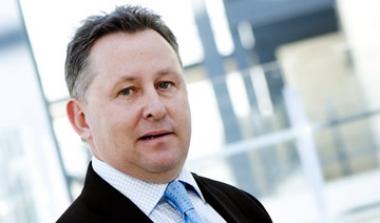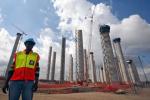SA’s R847bn Infrastructure development plan needs REIPPP process adoption
 Nedbank Capital Head of Infrastructure, Energy and Telecoms, Mike Peo says the lack of a clear framework has been one of the key challenges towards allocating and spending funds appropriately on strategic infrastructure projects.
Nedbank Capital Head of Infrastructure, Energy and Telecoms, Mike Peo says the lack of a clear framework has been one of the key challenges towards allocating and spending funds appropriately on strategic infrastructure projects.
The success to Government’s Renewable Energy Independent Power Producer (REIPPP) programme, could be key answer to the roll-out of big projects in South Africa’s R847 billion infrastructure development plan which has largely stalled.
If this spend is to yield effective results, rapid progress must be made in converting the policy frameworks and legislation embedded in the New Growth Path, National Development Plan (NDP) and Infrastructure Development Bill into tangible projects which are ready to go to market.
Recently, Pretoria Portland Cement (PPC) CEO, Ketso Gordhan called for reforms in the infrastructure procurement processes and proposed the creation of professional oversight bodies to fast-track infrastructure projects.
Speaking at a Nedbank infrastructure round table on Tuesday, Nedbank Capital Head of Infrastructure, Energy and Telecoms, Mike Peo said that historically the lack of a clear framework has been one of the key challenges towards allocating and spending funds appropriately on strategic infrastructure projects.
“For spend on infrastructure to be effective there firstly needs to be the right policy framework, and an acceptable regulatory framework coupled with projects which are “bankable”, irrespective of whether or not these are to be funded by the public or private sector.” he said.
“The NDP, which led to the promulgation of the Infrastructure Development Act which sets the framework for the Presidential Infrastructure Coordinating Commission (PICC), means that for the first time in the democratic South Africa, we have a clear policy basis from which to work. The next question is how to turn this into action,” says Peo.
He notes that the success of the Renewable Energy Independent Power Producer (REIPPP) programme is a good starting point, as it can be heralded as the most successful large scale procurement programme ever undertaken between the private and public sector in South Africa – with 66 renewable energy projects banked inside of 24 months, at a project value in excess of R150 billion.
Key learnings from the REIPPP programme show there are specific principles that must be incorporated to ensure a successful outcome to infrastructure procurement which include policy and regulatory certainty; a well-formulated, best practices bidding process; prior engagement with key stakeholders; and a proper contractual framework.
“To attract the amounts of capital required to bid for large scale infrastructure projects, whether as a project developer, equity provider or financier, it is critical that there is certainty in the process – confidence that the projects will proceed after capital is invested in developing such projects, certainty as to the bidding requirements and assurance that the obligations of all parties involved will be fulfilled. During the REIPPP programme, Government made the financial commitment required to hire best of breed advisers in order to properly structure the programme and establish a workable bidding process. Furthermore, engagement with all interested parties, including the major South African banks, assisted in ensuring the programme would be defined by bankable projects,” says Peo.
He says part of the success of this programme can be attributed to the creation of an inter-Ministerial commission up-front that worked to ensure the freeing up of any potential bottlenecks.
Peo maintains that the procurement of large scale infrastructure projects through regulated Public Private Partnerships (PPP’s) is a major form of both attracting private sector participation through development, construction, operation and financing – all in line with the objectives set out in the NDP.
The PPP mechanism allocates risks in a project to the party best suited to assuming such risk, generally ensuring that projects are completed in time and on budget and in accordance with value for money and affordability parameters set by the State. Common criticisms regarding “economic rent” are easily accommodated if PPP’s are properly structured. Particularly where Government is constrained by capacity and the fiscus is constrained in providing the spend needed on balance sheet, then the private sector must and is generally willing and able to step in and fulfil this role.
Nicky Weimar, Senior Economist at Nedbank, notes however that general foreign investor sentiment towards South Africa has deteriorated as a result of the country’s stagnating economy, which can largely be attributed to persistent and significant infrastructure constraints.
“Speedy and cost-effective progress with infrastructure will undoubtedly improve foreign perceptions of risk in South Africa and consequently help to build the case for upgrades to our credit ratings in the years to come. Delivery on infrastructure enables the private sector to expand capacity, employ more people and produce more goods and services, creating a virtuous circle that will help to reduce the fiscal deficit and allow for more room to deliver on key social services,” says Weimar.
“The need for strategic infrastructure projects to be prioritised and implemented is critical; by taking key learnings from successful programmes such as REIPPP, we can work to ensure that these projects come to fruition and do not suffer the bottlenecks or underspending that we have seen in the past,” concludes Peo.

















